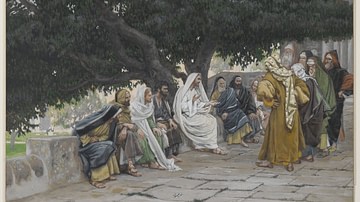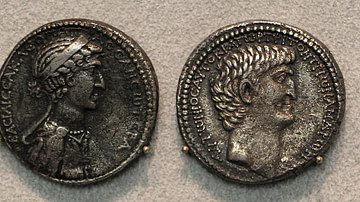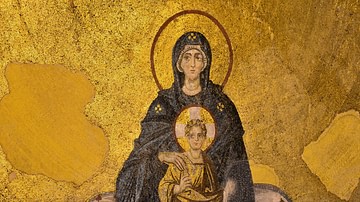Search
Did you mean: Mari?
Search Results

Article
The Trial & Crucifixion of Jesus of Nazareth
The central pillars of Christianity originate from the story of the trial, crucifixion, and death of Jesus Christ. The events cover the time when Jesus of Nazareth and his followers entered Jerusalem for the festival of Passover to Sunday...

Article
The Life of Jesus of Nazareth in the Gospels
The only sources for the life of Jesus of Nazareth are in the canonical gospels (or the gospels that were included in the authorised version of the New Testament). We have no contemporary, eyewitness testimony from the time that he lived...

Article
Jesus & the Law of Moses
New Testament studies now place Jesus Christ within the parameters of Second Temple Judaism in the 1st century CE, attempting to go behind the layers of later Christian theology and philosophy (such as the trinity) to understand how his message...

Definition
Sadducees
The Sadducees were part of the upper-class aristocrats and provided much of the priesthood, categorized through the lineage of priestly houses. They served on the Sanhedrin, the city council that organized law courts and regulations, which...

Definition
Caesarion
Ptolemy XV Caesar “Theos Philopator Philometor” (“the Father-loving Mother-loving God”) (c. 47-30 BCE), better known by his unofficial nickname Caesarion or “Little Caesar” in Greek, was the oldest son of Cleopatra VII (69-30 BCE) and was...

Definition
Cleopatra VII
Cleopatra VII (l. c. 69-30 BCE, r. 51-30 BCE) was the last ruler of Egypt before it was annexed as a province of Rome. Although arguably the most famous Egyptian queen, Cleopatra was actually Greek and a member of the Ptolemaic Dynasty (323-30...

Definition
Jesus Christ
Jesus Christ is the designation of Jesus of Nazareth (d. c. 30 CE), who was an itinerant Jewish prophet from the Galilee in northern Israel. He preached the imminent intervention in human affairs by the God of the Jews, when God would establish...

Definition
Alexander Helios
Alexander Helios (40 BCE – c. late 1st century BCE) was a member of the Ptolemaic dynasty, the second oldest son of Cleopatra VII (69 BCE – 30 BCE) and the twin brother of Cleopatra Selene II (40 BCE – 5 BCE). He spent the majority of his...

Article
The Origin of Satan
Satan, or the Devil, is one of the best-known characters in the Western traditions of Judaism, Christianity, and Islam. Surprisingly, this entity was a late-comer in the ancient world. Satan, as a totally evil being, is nowhere to be found...

Article
Women in the New Testament
Women in the New Testament are presented for the most part along the contours of both Jewish and Greco-Roman concepts of the social construction of gender roles. Women’s value to society was in their role in procreation. There are some exceptions...